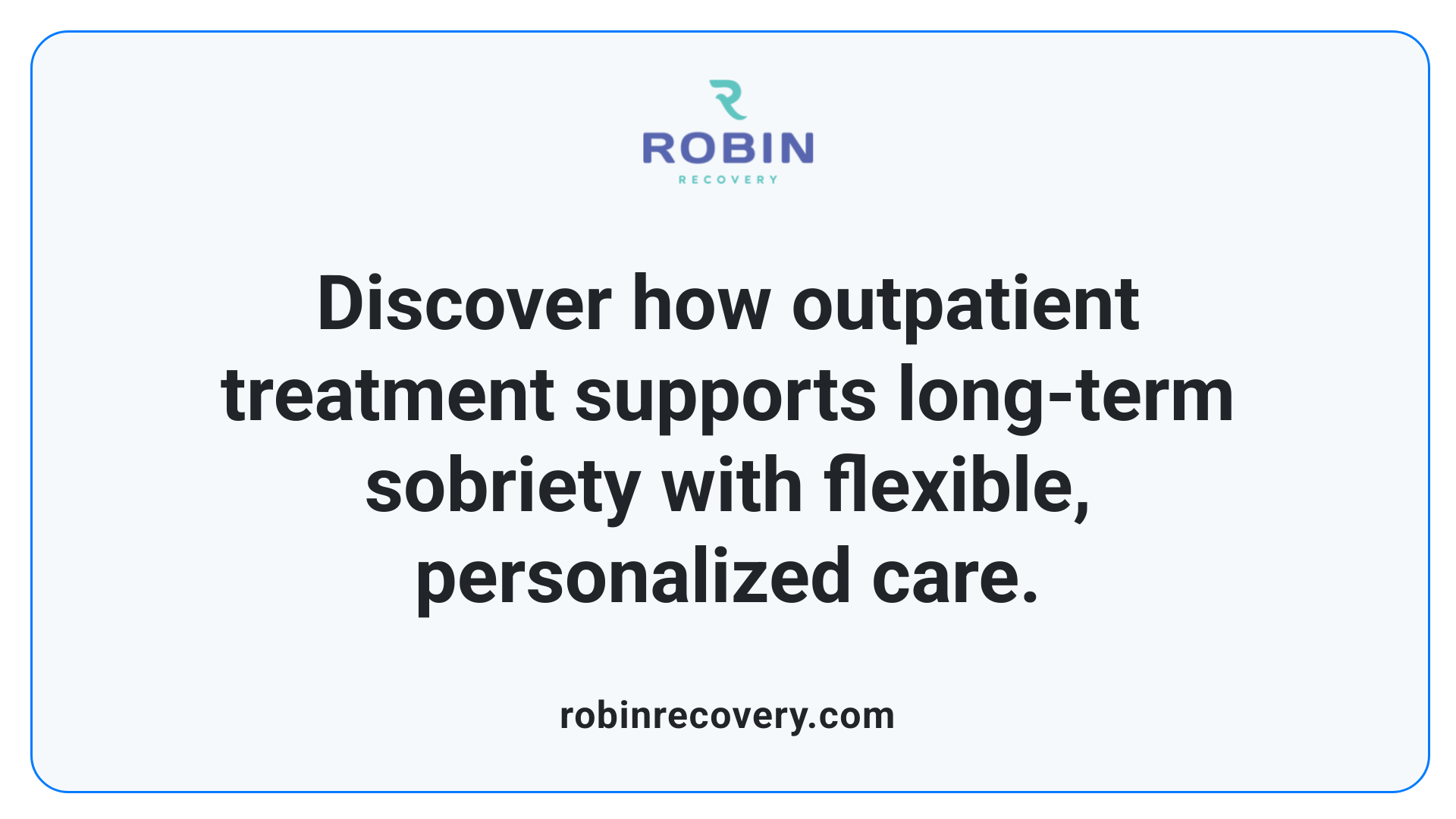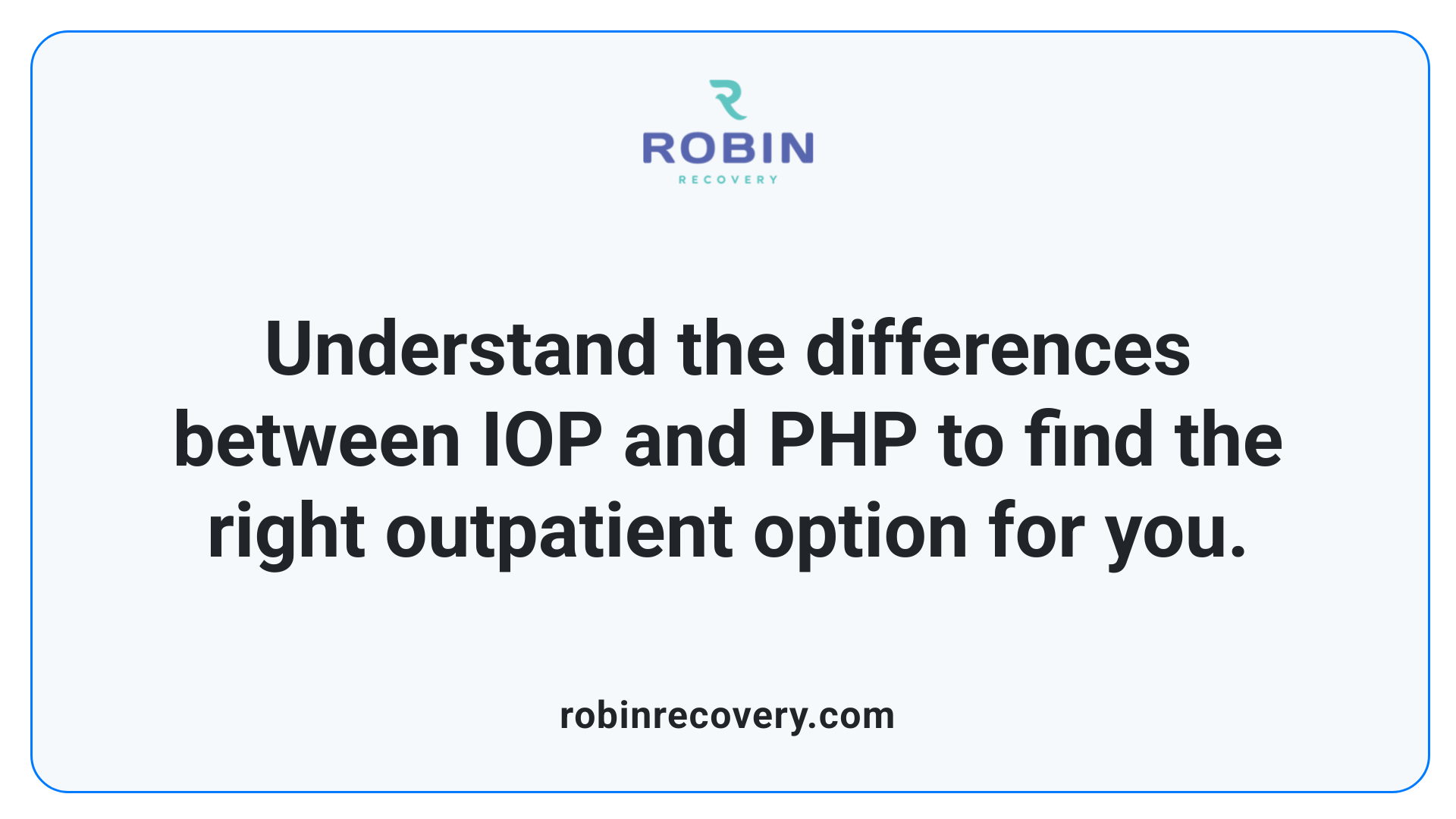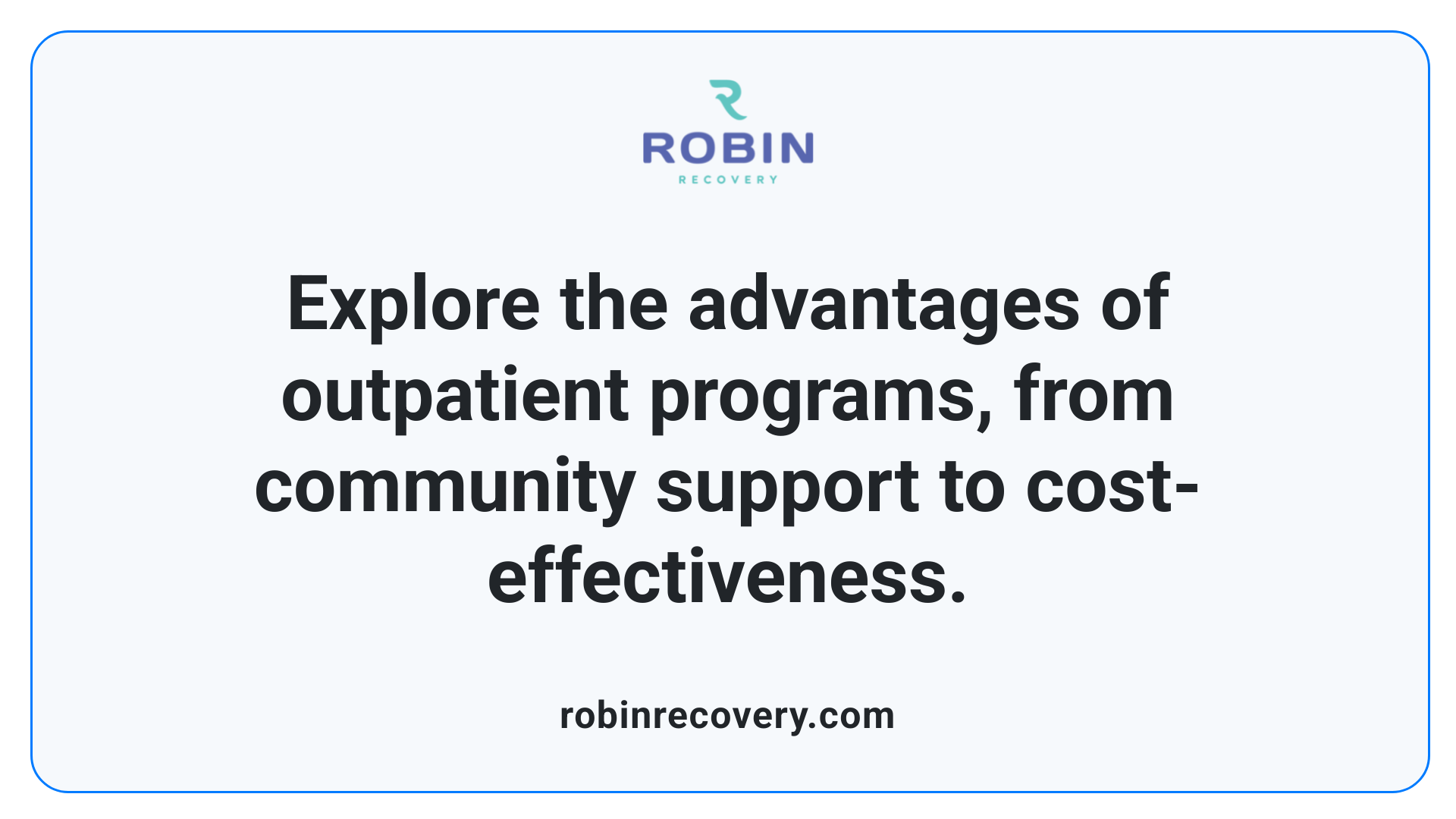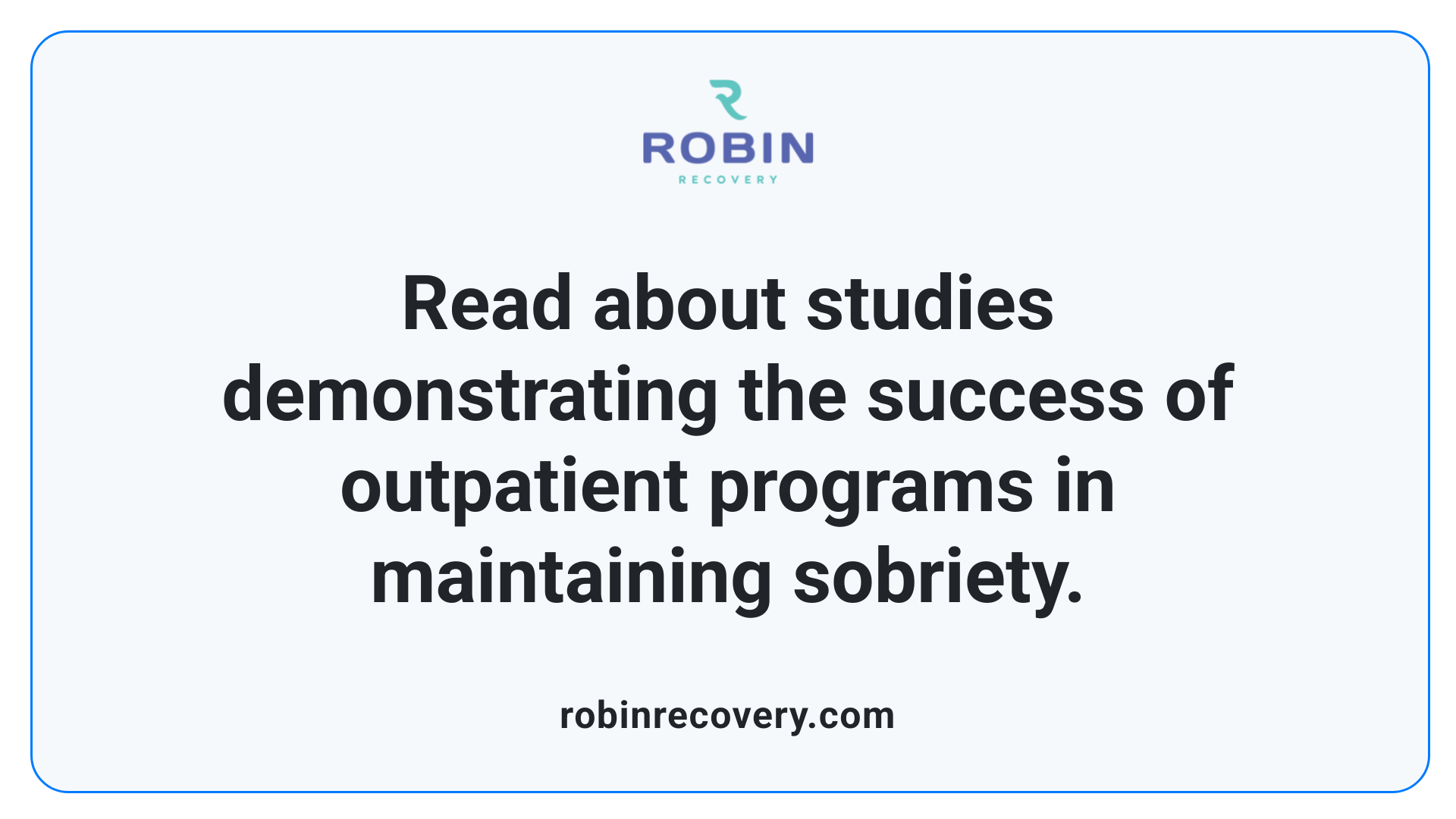The Benefits of an Outpatient Program for Long-Term Recovery

Introduction to Outpatient Programs and Long-Term Recovery
Outpatient programs have become a cornerstone in the continuum of addiction treatment, especially for individuals seeking sustainable, long-term recovery from substance use disorders. Unlike inpatient or residential care, outpatient treatment offers flexibility, accessibility, and personalized care tailored to individual needs. This article explores the significant benefits of outpatient programs, the various levels of care available, their effectiveness, and how they support ongoing sobriety—empowering individuals to rebuild their lives while maintaining daily responsibilities.
Understanding Outpatient Treatment and Its Role in Recovery

What is outpatient treatment and how does it support long-term recovery from substance use disorders?
Outpatient treatment is a flexible approach that allows individuals to receive care for substance use disorders while maintaining their daily responsibilities, such as work or school. It encompasses various levels of intensity, including partial hospitalization, intensive outpatient programs (IOPs), and standard outpatient therapy, all tailored to meet the individual's specific needs.
These programs utilize evidence-based strategies like cognitive-behavioral therapy (CBT), motivational interviewing, 12-step facilitation, and community reinforcement. Such methods focus on relapse prevention, building coping skills, and addressing underlying psychological factors related to addiction.
By offering ongoing therapeutic support within a community setting, outpatient treatment facilitates continued recovery and helps individuals sustain sobriety. It encourages long-term behavioral change by enabling participants to apply learned skills in real-world situations, fostering resilience and personal growth.
Overall, outpatient care provides accessible, personalized, and effective treatment options that support sustained recovery from substance use disorders. Its flexibility promotes a balance between recovery efforts and daily life commitments, making it a vital component in the continuum of addiction care.
Levels of Outpatient Care: IOP and PHP Explained

Outpatient treatment for substance use disorders includes different levels of intensity to cater to individuals' specific needs. Two prominent options are Intensive Outpatient Programs (IOP) and Partial Hospitalization Programs (PHP).
What are the different levels of outpatient care, such as IOP and PHP, and how do they differ?
Levels of outpatient care include IOP and PHP, which vary mainly in how much medical supervision they provide and how often individuals are required to attend sessions. An IOP usually involves three to five therapy sessions per week, each lasting around 2 to 4 hours. It offers a structured, supportive environment but allows individuals to continue working, attending school, and managing daily responsibilities.
In contrast, PHP is more intensive. It typically requires attending daily daytime sessions that last from about 4 to 6 hours, five to seven days a week. These programs are designed to provide more comprehensive medical oversight, including medication management, psychiatric care, and various therapy modalities such as individual, group, and family therapy.
Differences between IOP and PHP
Aspect IOP PHP Details Frequency of sessions 3-5 times per week Daily, 5-7 days per week PHP provides more frequent and longer sessions. Duration of each session 2-4 hours 4-6 hours PHP sessions are generally longer. Medical oversight Less intensive, may include medical monitoring More comprehensive, includes medical and psychiatric support PHP offers direct medical oversight. Suitability For less severe, stable cases For individuals needing stabilization or with more severe issues Choice depends on treatment needs and stability.
Placement of IOP and PHP within the treatment continuum
Both IOP and PHP serve as vital components in the continuum of care for substance use disorders. They often act as step-down programs following inpatient or residential treatment, helping individuals transition back to daily life while continuing to address recovery goals. PHP can also be used as an initial treatment for those requiring intensive support but not 24/7 supervision.
Long-term recovery often involves transitioning through various levels of outpatient care, with IOP and PHP serving specific roles based on the severity of addiction and necessary medical support. This flexible structure allows tailored treatment paths, promoting stability and sustained sobriety.
Benefits of Outpatient Programs in Long-Term Addiction Recovery

What are the benefits of outpatient care for addiction recovery?
Outpatient treatment programs offer a range of advantages that support individuals seeking to overcome substance use disorders. One of the most notable benefits is their flexibility, allowing participants to continue with daily routines like work, school, and family responsibilities. This integration into everyday life helps sustain treatment and promotes real-world application of coping skills learned during therapy.
These programs are also generally more cost-effective than inpatient options, reducing financial barriers and making recovery accessible to a broader population. Since outpatient care can be tailored to each person's unique needs, it often includes personalized treatment plans that address specific mental health issues, underlying causes of addiction, and social circumstances.
Community support plays a vital role in outpatient programs. Connecting individuals with peer groups, family therapy, and community resources fosters a sense of belonging and reduces feelings of isolation. This social reintegration is crucial for building a reliable support network that encourages long-term sobriety.
Moreover, outpatient services actively address co-occurring mental health disorders, such as anxiety or depression, through integrated care models. This comprehensive approach enhances overall well-being and increases the chances of sustained recovery.
Overall, outpatient programs are highly effective for long-term recovery due to their emphasis on flexible scheduling, personalized care, community engagement, and integrated mental health treatment. These qualities help individuals develop resilience, maintain sobriety, and rebuild their lives while managing everyday responsibilities.
Research Evidence Supporting Outpatient Effectiveness

Outpatient addiction treatment, especially Intensive Outpatient Programs (IOPs), has demonstrated strong evidence supporting its success in helping individuals maintain long-term sobriety. Studies show that approximately 60-70% of patients participating in outpatient programs achieve abstinence at follow-up. This success rate is comparable to, and in some cases even rivals, the outcomes from inpatient or residential treatment.
Research, including randomized trials and observational studies, highlights that outpatient programs effectively reduce alcohol and drug use over time. Participants often experience substantial improvements in their substance use behaviors, with many sustaining these gains months or years after completing treatment.
Compared to inpatient care, outpatient programs offer benefits such as longer treatment durations, community engagement, and flexibility to incorporate treatment into everyday life. They also tend to be more accessible and cost-effective, which makes them suitable for a broader population. Importantly, the community-based nature of outpatient treatment supports ongoing social and peer support, vital elements in long-term recovery.
Meta-analyses and reviews consistently find that treatment outcomes for outpatient programs match those of inpatient care in terms of sobriety, quality of life improvements, and mental health stabilization. The continuity of care, relapse prevention strategies like cognitive-behavioral techniques, and family involvement all contribute to enduring recovery.
In summary, outpatient programs are a crucial part of the addiction treatment spectrum. They offer effective, flexible, and sustainable options for maintaining sobriety, especially when paired with ongoing community support and aftercare services, leading to higher long-term success and resilience against relapse.
Long-Term Recovery Strategies and Support Systems

What role does outpatient treatment play in long-term addiction recovery?
Outpatient treatment is essential in supporting sustained sobriety over the long term. It offers a flexible and individualized approach that allows individuals to continue managing daily responsibilities like work and family while receiving ongoing care.
Programs such as Intensive Outpatient Programs (IOPs) and standard outpatient services focus on relapse prevention, behavioral strategies, and community engagement. Studies show that these programs can be as effective as inpatient care for many individuals, primarily because they facilitate real-world application of coping skills.
Addressing co-occurring mental health issues through integrated care improves overall well-being and helps prevent relapse. Family involvement through therapy sessions strengthens support systems, which are crucial for long-lasting recovery.
Support groups such as Alcoholics Anonymous (AA) or Narcotics Anonymous (NA), along with community resources, connect individuals with peers and social networks that reinforce sobriety.
Ongoing care, including follow-up therapy and relapse management, creates a safety net that encourages resilience. Additionally, sober living environments or recovery housing offer stable settings, fostering independence and accountability.
Overall, outpatient treatment forms a cornerstone of the long-term recovery process by blending personalized therapy, social support, and continuous monitoring. This comprehensive approach helps individuals develop skills to navigate life's challenges and maintain their sobriety over years.
Conclusion: Embracing Outpatient Care for Lasting Sobriety
Outpatient programs offer numerous benefits that support long-term recovery from substance use disorders. They provide flexible scheduling, enabling individuals to attend therapy sessions while maintaining daily responsibilities such as work, school, and family commitments. These programs are often more affordable compared to inpatient treatments, making recovery accessible to a wider population. Personalization of treatment plans ensures that each person receives care tailored to their specific needs, including addressing co-occurring mental health conditions.
Continuity of care is a hallmark of outpatient treatment, with ongoing support, relapse prevention strategies, and community engagement playing vital roles in sustaining sobriety. Community and family involvement are emphasized, helping to reinforce support networks that are crucial during recovery.
Research indicates that outpatient programs, especially Intensive Outpatient Programs (IOPs), are highly effective in maintaining long-term sobriety. Studies show success rates of approximately 60-70%, with outcomes comparable to inpatient or residential treatment settings. These findings underscore the importance of outpatient care as part of the overall continuum of addiction treatment.
With sustained support, skill development, and community involvement, outpatient programs serve as a powerful tool in achieving lasting sobriety. They empower individuals to rebuild their lives, fostering resilience and confidence to face everyday challenges without substance dependence.
Given these benefits, individuals seeking recovery are encouraged to consider outpatient options as a practical, effective pathway to lasting sobriety and improved well-being.
Final Thoughts on the Advantages of Outpatient Treatment
Outpatient programs represent a flexible, effective, and accessible approach to achieving and maintaining long-term sobriety. Their capacity to integrate treatment into daily life, combined with proven outcomes and holistic support systems, makes them an invaluable option for many individuals on their recovery journey. Continued engagement through therapy, community involvement, and family support enhances the likelihood of sustained sobriety, underscoring the vital role outpatient care plays in lasting recovery.
References
- Substance Abuse Intensive Outpatient Programs
- The Top 10 Benefits of Outpatient Treatment for Alcohol ...
- Inpatient Vs. Outpatient Rehab
- The Benefits of Outpatient Substance Abuse Treatment for ...
- Top 10 Benefits of Choosing Outpatient Treatment for ...
- Benefits of Outpatient Treatment for Opioid Recovery
- 6 Signs Outpatient Treatment May Be Right For You
- Why Long-Term Addiction Treatment with IOP and Outpatient ...
- The Benefits of Choosing Outpatient Rehab in New York
- How Outpatient Treatment Can Support Long-Term Sobriety
